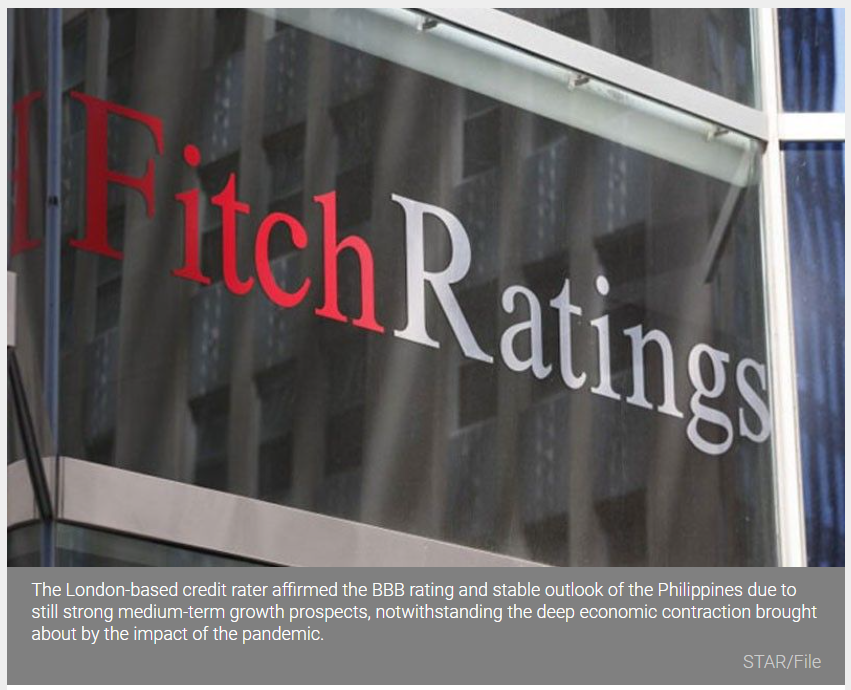Fitch affirms Philippines’ investment grade rating
MANILA, Philippines — The Philippines is seen recovering from the pandemic-induced recession with a gross domestic product (GDP) growth of 6.9 percent this year and eight percent next year, prompting international debt watcher Fitch Ratings to affirm the country’s credit rating and outlook.
The London-based credit rater affirmed the BBB rating and stable outlook of the Philippines due to still strong medium-term growth prospects, notwithstanding the deep economic contraction brought about by the impact of the pandemic.
“We expect economic activity to continue to recover in the coming quarters, and project GDP to expand by 6.9 and eight percent in 2021 and 2022, respectively. New daily recorded COVID-19 cases have been declining in recent months, reflecting an effective government response to the crisis and reducing the risk of renewed lockdowns,” Fitch said.
Fitch said the Philippine economy likely contracted by 8.5 percent in 2020, ending 22 years of positive economic growth. The Philippines last suffered a recession in 1998 with a GDP contraction of 0.5 percent due to the Asian financial crisis.
“The economic impact of the COVID-19 shock for the Philippines in 2020 was more significant than we had previously expected due to the domestic infection rate and government policy measures to curb the spread of the virus,” Fitch said.
Bangko Sentral ng Pilipinas (BSP) Governor Benjamin Diokno said monetary authorities responded immediately to the pandemic with a rate cut as early as February last year.
“The BSP was among the first central banks in the world to respond to the pandemic with a policy rate cut as early as February last year. We deemed it important to signal to the market that we were ready to act swiftly and decisively to buoy market confidence, as well as to ensure sufficient liquidity and efficient functioning of the financial system,” Diokno said.
The central bank unleashed about P2 trillion into the financial system through various COVID-19 response measures, including the 200 basis points cut in interest rates, the lowering of the reserve requirement ratio of banks, unprecedented measures such as counting of loans to micro, small and medium enterprises (MSMEs) as compliance with the RRR, among others.
“Given that the BSP, along with the rest of government, did its homework last year, we can see better days ahead as we look forward to the distribution of anti-COVID vaccines in the country,” Diokno said.
Fitch said the potential for a delay in the rollout of COVID-19 vaccines poses downside risks to our growth forecasts, while an effective vaccine rollout could result in a faster-than-expected recovery in growth.
The authorities have also engaged in multilateral initiatives and with several pharmaceutical companies to secure vaccines, with a rollout expected to start in May.
For his part, Finance Secretary Carlos Dominguez said “the rating and outlook by Fitch shows that the country has remained credit and investment worthy throughout the global COVID-19 crisis.”
Dominguez said the country’s strong economy provided enough fiscal space to deal with the unprecedented health and economic crises, while the whole-of-government approach in saving lives, protecting communities and livelihoods, and providing relief to the hardest hit families, workers, and businesses helped keep the economy afloat.
The finance chief said the country remained committed to prudent fiscal and debt management despite higher spending on COVID-19 response measures to revive the economy and restore both business and consumer confidence.
“As soon as the pandemic struck in early 2020, the Duterte administration came up with and shepherded the swift congressional passage of twin legislation (Bayanihan 1 and 2) designed to beef up our healthcare infrastructure, extend the biggest emergency subsidies ever to poor families and dislocated workers, and provide relief to businesses, especially MSMEs,” Dominguez said.
The government is also working with Congress on the quick passage of the Corporate Recovery and Tax Incentives for Enterprises (CREATE) and the Financial Institutions Strategic Transfer (FIST) bills to stimulate economic activity and speed up the country’s recovery from the pandemic-driven global growth slump.
Fitch likewise recognized that “the Philippines external finances remain a credit strength,” citing gross international reserves (GIR) that are expected to remain equivalent to nine or 10 months of imports and other external payments this year and next year. This compares with international standards, which suggest that GIR worth at least three months of import cover is sufficient.
The debt watcher also expects the Philippine banking system to remain stable, with sufficient provisioning of banks that allow them to absorb any potential credit losses arising from the crisis.
In 2020, Fitch implemented 51 credit rating downgrades affecting 33 sovereigns (some sovereigns were downgraded more than once). These include countries that previously had the same rating as the Philippines, such as Mexico, Colombia, and Italy – whose ratings were downgraded by a notch to the minimum investment grade of BBB.
Source: https://www.philstar.com/business/2021/01/12/2069750/fitch-affirms-philippines-investment-grade-rating


 Thailand
Thailand




